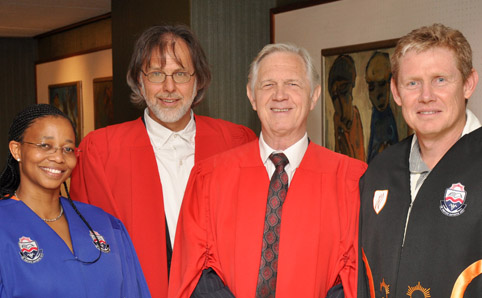Latest News Archive
Please select Category, Year, and then Month to display items
13 August 2024
|
Story Anthony Mthembu
|
Photo Sibahle Dayimani and Amandla Kulu
 Prof Peter Roseel, Managing Director of Management Consulting and Research – a spin-off of the Catholic University of Leuven in Belgium; and Prof Nicolene Barkhuizen, Director of the UFS Business School.
Prof Peter Roseel, Managing Director of Management Consulting and Research – a spin-off of the Catholic University of Leuven in Belgium; and Prof Nicolene Barkhuizen, Director of the UFS Business School.
The Business School at the University of the Free State (UFS) hosted Prof Peter Rosseel, Managing Director of Management Consulting and Research – a spin-off of the Catholic University of Leuven in Belgium – for a guest lecture during his visit to the UFS Faculty of Economic and Management Sciences (EMS).
The guest lecture took place on 19 July 2024 in the Business School Auditorium and was attended by academics from the UFS.
Reflecting on the lecture
The lecture presented by Prof Rosseel focused on how combining strategy, strategy implementation, culture transformation, leadership, and learning successfully leads to sustainable growth, creates engagement, and delivers tangible results. Throughout the lecture, Prof Rosseel spoke about how experts tend to make bad leaders and therefore stop change from happening within an organisation. In fact, he highlighted that, “Experts stop change from happening within the workplace because experts, by definition, look through the eyes of their expertise, but you cannot reduce the world to different forms of expertise, as it is holistic.” As such, he argued that to change an organisation, one must see things from the point of view of others.
Furthermore, Prof Rosseel delved deeper into the hierarchical operating model within organisations. He indicated that the above model should be one community within organisations; however, unfortunately it is not. This is because organisations are made up of several departments such as finance and human resources. As such, he regards these departments to be silos that could prove to be detrimental to organisations, as each silo can create its own culture as opposed to an organisational culture. These are some of the points he discussed throughout the lecture.
After the lecture concluded, the audience had the opportunity to engage with Prof Rosseel on his viewpoints. In fact, Lyle Markham, Academic Head of Department and Lecturer in Industrial Psychology at the UFS, was one of the audience members and described the lecture as insightful.
Professor suggests San place-name book
2011-09-28
|

|
At the inaugural lecture of Prof. Raper were, from left to right: Dr Choice Makhetha, Vice-Rector: External Relations (actg); Prof. Theo du Plessis, head of our Department of Language Management and Language Practice; Prof. Raper; and Prof. Lucius Botes, Dean of our Faculty of Humanities.
Photo: Stephen Collett
|
Prof. Peter Raper, Honorary Professor: Linguistics, in the Department of Language Management and Language Practice at our university, delivered his inaugural lecture on Tuesday, 27 September 2011. Prof. Raper focused on the topic of “Interpretations and translations of Bushman (San) place names” and he recommended the establishment of a chair for Khoikhoi and Bushman name studies at the UFS. Prof. Raper said that, until about 2 000 years ago, the Bushmen and their ancestors were the only inhabitants of southern Africa and that, presumably, all place names in the region were of Bushman origin. Prof. Raper also suggested the publication of a dictionary of Bushman place names which will contribute to restoring and preserving Bushman toponymic, linguistic and cultural heritage.
In his inaugural lecture, Prof. Raper distinguished between the terms Bushman and San. He said “the term Bushman was for a long time considered an insult and San was preferred. Recently, Bushman became preferable and San is considered an insult”.